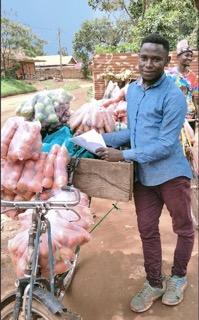Increasing Profits through Subsidized Microenterprise Relocation in Uganda
- Entrepreneurs
- Firms
- Urban population
- Self-employed and microentrepreneurs
- Business investment
- Job mobility
- Productivity
- Profits/revenues
- Take-up of program/social service/healthy behavior
- Behavioral economics
- Cash transfers
- In-kind transfers
- Unconditional cash transfers
Those self-employed in microenterprises, who often report low profits and own few assets, account for fifty percent of the labor force in low-income countries. Researchers are conducting a randomized evaluation to test the effect of relieving constraints to microenterprise relocation on business income in Kampala, Uganda.
Policy issue
In low-income countries, self-employment accounts for fifty percent of the labor force, and most enterprises hire few or no employees and have low profits. These microenterprises often operate in mobile, low-capital sectors such as street vending and transportation. Self-employment in these sectors may be involuntary, as many microentrepreneurs may lack the opportunity for wage work within the local labor market.
Most traditional microfinance programs that seek to alleviate poverty, bolster opportunity, and increase profits for the self-employed have yielded mixed results, increasing incomes for select groups, such as experienced entrepreneurs, but not for others. On the other hand, programs that address workers’ geographic restrictions have increased earnings, and microentrepreneurs may not be taking advantage of location-based financial opportunities. This study examines whether an alternative program that subsidizes business relocation within the city can increase profits for microentrepreneurs. If so, what types of constraints limit a firm’s ability to relocate to more profitable areas?
Context of the evaluation
In Uganda, self-employment accounts for over 77 percent of the labor force as of 2019. In Kampala, where this evaluation takes place, 90 percent of microentrepreneurs earn less than US$1.90 per day, 80 percent are located within walking distance from their homes, and nearly 50 percent identify competition or lack of customers as an impediment to business growth. These urban microenterprises most often work as vendors selling goods and services and typically own few assets.
In an earlier pilot study, researchers found substantial variation in microenterprise profits throughout the city. Microentrepreneurs reported a high desire to expand their businesses but may not be taking advantage of potentially profitable business relocation opportunities. Microentrepreneurs in the study have an average of five years of business experience, less than 10 percent hire any paid employees, and many have low levels of formal education. The median income of each firm is US$2.83 per day and nearly 95 percent of firms in the sample also express wanting to expand their business.

Details of the intervention
In partnership with the Kutamani Agency, researchers conducted a randomized evaluation to test the impact of business relocation on the profits of mobile, low-capital microentrepreneurs. Researchers randomly assigned 2,880 entrepreneurs into one of six groups:
- Conditional cash grant (720 firms): Participants received a conditional cash grant valued at US$2 per day for ten working days. The grant was available to business owners daily if they moved their business location.
- Conditional cash grant and Information (720 firms): Participants received a conditional cash grant valued at US$2 per day for ten working days, along with information about the profit dispersion for businesses in their sector operating throughout the city.
- Unconditional cash grant (360 firms): Participants received an unconditional cash grant (of equivalent value to the conditional cash grant, US$2 per day for ten working days).
- Unconditional cash grant and Information (360 firms): Participants received an unconditional cash grant valued at US$2 per day for ten working days, along with information about the profit dispersion for businesses in their sector operating throughout the city.
- Information only (360 firms): Participants received information about the profit dispersion for businesses in their sector operating throughout the city.
- Comparison group (360 firms): Participants did not receive any form of monetary compensation or information about profit dispersion across the city.
The researcher also assessed time inconsistency, personal agency, and susceptibility to intrahousehold demands, which may influence response to the treatment.
Results and policy lessons
Research ongoing; results forthcoming.